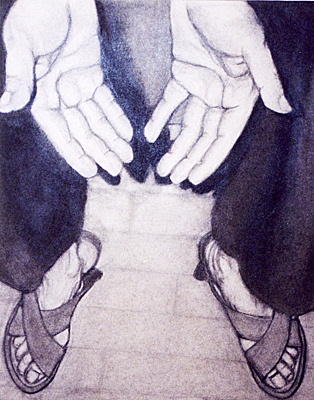All Nonfiction
- Bullying
- Books
- Academic
- Author Interviews
- Celebrity interviews
- College Articles
- College Essays
- Educator of the Year
- Heroes
- Interviews
- Memoir
- Personal Experience
- Sports
- Travel & Culture
All Opinions
- Bullying
- Current Events / Politics
- Discrimination
- Drugs / Alcohol / Smoking
- Entertainment / Celebrities
- Environment
- Love / Relationships
- Movies / Music / TV
- Pop Culture / Trends
- School / College
- Social Issues / Civics
- Spirituality / Religion
- Sports / Hobbies
All Hot Topics
- Bullying
- Community Service
- Environment
- Health
- Letters to the Editor
- Pride & Prejudice
- What Matters
- Back
Summer Guide
- Program Links
- Program Reviews
- Back
College Guide
- College Links
- College Reviews
- College Essays
- College Articles
- Back
The Gift of Humanitarian Aid
Maamohelang Hlaha and her husband live in Africa and are HIV positive. Her four surviving children are HIV-free because of antiretroviral treatment that is becoming more accessible to people in countries around the world. Imagine the pain of her diagnosis, as she worried about her children’s future. Through the United States President’s Emergency Plan for Aids Relief (PEPFAR), Maamohelang was given the priceless gift of hope, and her children were given the gift of life.
Humanitarian aid, assistance given in times of crisis or to those in need, is a way of producing equality for all people and is vital to creating a just society and world.
Humanitarian aid promotes equality for all people, and is an essential component to any just society. PEPFAR is a successful example of generating equality through humanitarian aid. In 2010 alone, “PEPFAR directly supported life-saving antiretroviral treatment for more than 3.2 million men, women and children worldwide” (PEPFAR Funding). Mark Harrington deemed PEPFAR “the most successful U.S.-funded global health program in history” (Harrington, 2012). PEPFAR is transforming lives by providing life-saving, life-changing treatment to people around the world, and through providing equal opportunities for medical care for those who may not otherwise receive it.
Peter Singer, a Utilitarian philosopher explains the importance of giving to programs like PEPFAR: “each one of us with wealth surplus to his or her essential needs should be giving most of it to help people suffering from poverty so dire as to be life-threatening.” The United States government should be working to meet the needs of those in other countries. Unfortunately, it doesn’t appear as though that is what the future of humanitarian aid holds.
Humanitarian aid is projected to face immense cuts for the sake of financial security in the United States. In the U.S., Humanitarian aid has been targeted in order to lower the deficit. Mitt Romney has proposed to make cuts to Humanitarian aid in order to lower the United States deficit, as he feels that “it doesn’t make a lot of sense for us to borrow money from the Chinese to go give to another country for humanitarian aid.” Mitt Romney’s plan sacrifices equality for financial security. He has a point, and if the United States goes bankrupt, no money will be given to humanitarian aid. While this is true, President Obama states that foreign aid only makes up about one percent of the U.S. budget, and cutting it would not significantly lower the deficit. In early 2012, President Obama proposed a $550 million cut to PEPFAR (The Atlantic). While cutting aid is one strategy for producing more financial security in America, this makes other countries susceptible to increased poverty, HIV/AIDS cases, deaths, and inequality.
Cutting humanitarian aid from the United States budget is a small step to create more happiness and less pain in the United States. However, this cut doesn’t address what is creating the greater joy in our world. Utilitarianism bases morality on what is causing the most good, and least bad. According to a Utilitarian, the ends justify the means, and we must do whatever it takes in order to achieve greater happiness. In this case, that may mean risking our country’s financial security, but as long as more good is created through giving foreign aid, this is the morally correct decision.
The benefits of continuing to give to humanitarian aid outweigh the benefits of creating financial stability in our country. Imagine the priceless joy of a child who is able to see her diseased mother healthy after suffering from AIDS. Visualize the gratitude of a mother who doesn’t have to wake up each day wondering if her child will die from malaria. Picture the rekindled hope of a hurricane victim when they receive a new home after they’ve watched their entire life ripped to shreds. Having the U.S. government in a secure financial position is incomparable to these images.
When we help others and care for them, we are authors of justice. This justice should drive our fight for equality in all nations, as lives are transformed by the generosity of the wealthy.
America has the potential to continue changing lives and change our world through humanitarian aid. Our country has the potential to give the greatest gift of all- the gift of assistance and hope.
What will you stand for?
Bibliography:
"Mitt Romney on International Aid." 2011. The Political Guide. Web. 18 Oct. 2012. <http://www.thepoliticalguide.com/Profiles/Governor/Massachusetts/Mitt_Romney/Views/International_Aid/>.
"Obama's Speech on Deficit Cutting." Speech. George Washington University. NPR. Web. 18 Oct. 2012. <http://www.npr.org/2011/04/13/135383045/president-obamas-speech-on-deficit-cutting>.
"Only Stronger U.S. Leadership Can End the AIDS Epidemic." The Atlantic. N.p., n.d. Web. 04 Nov. 2012. <http://www.theatlantic.com/politics/archive/2012/07/only-stronger-us-leadership-can-end-the-aids-epidemic/260235/>.
"PEPFAR Seventh Annual Report." PEPFAR. United States Government, n.d. Web. 23 Oct. 2012. <http://www.pepfar.gov/documents/organization/166734.pdf>.
"The Singer Solution to World Poverty, by Peter Singer." The Singer Solution to World Poverty, by Peter Singer. N.p., n.d. Web. 18 Oct. 2012. <http://www.utilitarian.net/singer/by/19990905.htm>.
Harrington, Mark. "Only Stronger U.S. Leadership Can End the AIDS Epidemic." The Atlantic. N.p., n.d. Web. 18 Oct. 2012. <http://www.theatlantic.com/politics/archive/2012/07/only-stronger-us-leadership-can-end-the-aids-epidemic/260235/>.

Similar Articles
JOIN THE DISCUSSION
This article has 0 comments.
